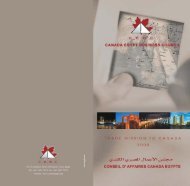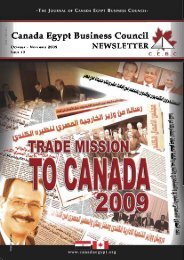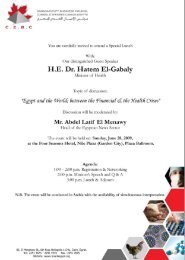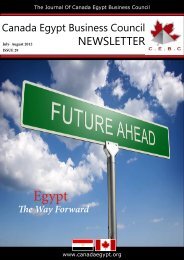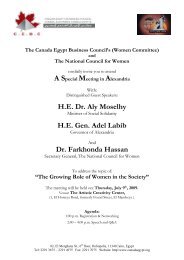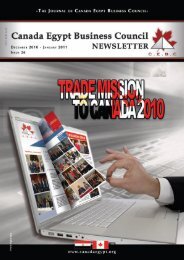NEWSLETTER - Canada Egypt Business Council
NEWSLETTER - Canada Egypt Business Council
NEWSLETTER - Canada Egypt Business Council
Create successful ePaper yourself
Turn your PDF publications into a flip-book with our unique Google optimized e-Paper software.
CEBC<br />
Savor <strong>Canada</strong><br />
Trudeau’s Multiculturalism Act is not the<br />
birthplace of this exceptional example<br />
of multiculturalism, it is a value that<br />
arguably has its roots in strategies<br />
laid by the political leaders of pre-<br />
Confederation <strong>Canada</strong>, John A.<br />
Macdonald and George Etienne<br />
Cartier, who were warned by the<br />
political and social divisions in the<br />
United States, which eventuated in<br />
civil war. Thus, determined to avoid<br />
political deadlock and civil strife,<br />
created a system of government<br />
that was aimed at safeguarding the<br />
country’s unity, despite the diversity<br />
of its composing population.<br />
In the current century, roughly<br />
200,000 immigrants go to <strong>Canada</strong><br />
each year, all of whom bring a<br />
wealth of heritage with their own language,<br />
culture, and religion and add it to the constantly evolving identity of <strong>Canada</strong>. As<br />
a result, Canadian culture is a mosaic of diverse elements. While immigrants maintain their<br />
identity and heritage, the acceptance and tolerance of their differences and the differences<br />
of others, which they see in <strong>Canada</strong>, makes the egalitarianism of multicultural <strong>Canada</strong> their<br />
new identity. <strong>Canada</strong>’s commitment to multiculturalism keeps its elements cohesive and<br />
strongly united. This, among other values of Canadian society, makes <strong>Canada</strong> a destination<br />
that is much desired by immigrants.<br />
But is this a historical inheritance, which Canadians do not relate to anymore, with all the<br />
xenophobia that is becoming prevalent elsewhere?, the answer is no, according to a recent<br />
poll run by Mosaic Institute and the Association for Canadian Studies, 82% of Canadians aged<br />
18 to 24 say that they believe multiculturalism in <strong>Canada</strong> is a model that other countries can<br />
learn from in trying to overcome their ethnic, religious or linguistic conflicts. On the other<br />
hand, older people are not as ardent about the Canadian model of multiculturalism, yet, all<br />
in all 64% of Canadians surveyed said they believe that <strong>Canada</strong>’s brand of multiculturalism<br />
is a model for other countries.<br />
In a world where differences are becoming increasingly grounds for wars, terrorism and<br />
oppression, a model of successful multiculturalism, which operates seamlessly, is of quintessential<br />
importance. While according to some Canadians, who took the survey, it is no a model to be<br />
exported, it is a necessary deterrent to war and divisions in other places of the world, and a rare<br />
success to pride on.<br />
CEBC 42



